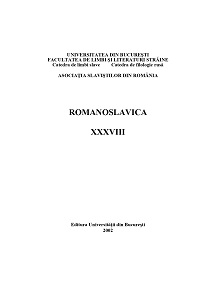N. D. ANDREEV’S PROTO-BOREAL THEORY AND ITS IMPLICATIONS IN UNDERSTANDING THE CENTRAL-EAST AND SOUTHEAST EUROPEAN ETHNOGENESIS: SLAVIC, BALTIC AND THRACIAN
N. D. ANDREEV’S PROTO-BOREAL THEORY AND ITS IMPLICATIONS IN UNDERSTANDING THE CENTRAL-EAST AND SOUTHEAST EUROPEAN ETHNOGENESIS: SLAVIC, BALTIC AND THRACIAN
Author(s): Sorin PaligaSubject(s): Historical Linguistics, Comparative Linguistics, Western Slavic Languages, Eastern Slavic Languages, South Slavic Languages, Baltic Languages, Philology
Published by: Editura Universităţii din Bucureşti
Keywords: N. D. Andreev; Proto-Boreal Theory; Implications; Central-East and Southeast European Ethnogenesis; Slavic; Baltic; Thracian;
Summary/Abstract: N. D. Andreev's theory, labelled Proto-Boreal, surprised – I may say – the scientific world by its large spectrum of linguistic problems: Proto-Indo-European, Proto-Uralic and Proto-Altaic (later he also added Korean) were considered as newer, derived branches from an older linguistic group labelled Proto-Boreal. It is also a difficult book as various languages are put together, regularly considered as belonging to different families according to traditional classifications.
Journal: Romanoslavica
- Issue Year: XXXVIII/2002
- Issue No: 1
- Page Range: 93-104
- Page Count: 12
- Language: English

